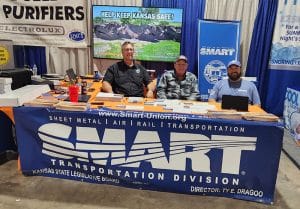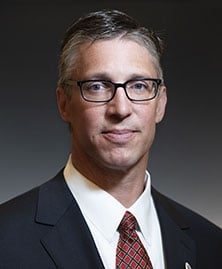This past week, SMART-TD’s Kansas Legislative Board engaged thousands of voters at the Kansas State Fair. Through their well-executed public outreach, the SMART-TD railroad union educated fairgoers about the dangers of long trains and blocked crossings. It was a message the public was ready to hear, as ordinary Kansans are on track to compose and mail an expected 3000 postcards demanding legislative action from their state representatives.
The public wants new laws for shorter, safer trains
SMART-TD’s Kansas Safety and Legislative Director, Ty Dragoo, spearheaded the outreach project.
“Any time you get to meet people you wouldn’t normally come in contact with and hear the stories of their personal interaction with the railroads, it is an eye-opener,” Dragoo stated. “The men and women working on the railroad are with them on their issues. We don’t want 15,000-foot-plus trains that block entire towns for hours at a time, and neither do they. To be able to have that conversation and follow it up by saying, ‘This is what our union is doing to fix it,’ and asking for their support is a powerful thing. The response we got from the people of Kansas was resounding support. As members and leaders of SMART Transportation, we need to do more of this kind of outreach.”
A successful model to engage the public

It seemed that almost everyone had a story about a train that blocked roadways for hours, disrupted their daily lives, and some situations proved fatal.
Attendees were attracted to the booth by a video loop highlighting a recent Kansas derailment. They could then discuss their own stories with SMART-TD staff.
Fairgoers then sent their personal experiences to their state legislators on postcards. Thousands of signed individual heartfelt notes about rail safety and excessive train lengths were mailed courtesy of SMART-TD.
The railroads cannot be trusted to look after community safety, so it falls to the SMART-TD railroad union to advocate for both rail workers and the public. Ordinary people will act to protect their communities if given the chance.
Let Dragoo’s work at the Kansas State Fair serve as a model for initiatives in other states. It underscores the importance of meeting the public, amplifying their concerns, and organizing their support for vital legislative changes. State by state, SMART-TD can pave the way for safer railroads and stronger communities across the nation.

